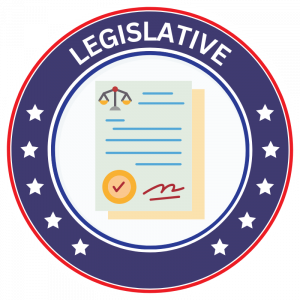The American Legion and the American Legion Auxiliary are interested in legislative measures which come before the United States Congress and State legislatures. Through lobbying efforts we are able to influence legislation of benefit to veterans, the community and our nation.
National and State Legislative Committee
The American Legion Auxiliary has a National legislative Committee which works closely with The American Legion National Legislative Commission. The American Legion Commission has offices in Washington. D.C. and continually promotes the passage of The American legion sponsored legislation. The American Legion and the American Legion Auxiliary also have Legislative Committees which function in a similar manner within the states.
Unit Support in Legislative Work
When measures important to The American Legion and the American Legion Auxiliary are before the lawmaking bodies, appeals go out for support. At such times the unit members should contact their representatives urging them to take the action desired.
Legislative Policy is Formed
In all matters of legislation the American Legion Auxiliary follows the action of The American Legion, never endorsing any measure until The American Legion has first endorsed it and never following a policy which does not coincide exactly with The American Legion’s stand.
At the Department Conventions The American Legion Department Convention outlines the policy to be followed in regard to measures to come before the legislatures of their states and also passes resolutions on national measures to be referred to the National Conventions.
Legislative Work for the Unit
The legislative activities of the Unit may be handled by the Unit President, by a standing Unit committee, or by a special committee appointed to conduct the work in special emergencies. The legislative matters usually deal with some other phase of Auxiliary work, such as Veterans Affairs and Rehabilitation – getting beneficial legislation for veterans; Children and Youth – securing legislation beneficial to children of veterans and military families, and children in general; National Security – securing national security measures; or Americanism – obtaining the passage of measures to promote better citizenship or to curb the activities of radicals. The arousing of public sentiment in support of such measures might well be left to the committee handling the activity under which they fall.
All Unit Legislative Chairmen should subscribe to The Dispatch. The American Legion’s publication.This biweekly newspaper describes current legislative issues and other news pertinent to The American Legion family. Subscription requests with payment should be sent to The Dispatch, The American Legion , PO Box 1055, Indianapolis, IN 46206.
7-Point Plan to Get Your Representative to Pay Attention
- Write the member a personal letter and expect a response within thirty days. Do not use a form letter or postcard.
- If you haven’t heard from your member, call to ask for a meeting with the staff member in charge of veteran’s issues.
- Be concise at the meeting. Have your facts straight and all your sources.
- Request that your issue/concern be placed on the radar screen and supported by your member.
- If the above isn’t working, stand outside the member’s office or committee door. Introduce yourself when she/he passes by and tell them about your concern as simply as possible. Back up your statement with facts.
- Send a thank you letter for the time and support the member gives to your issue.
- Hold her/him accountable. Send a note of appreciation if she/he votes yes. Send a note questioning a no vote.




